Christmas in Greece may not be the first place people think of for celebrating the holidays but it is a magical time of year.
Many flock to these idyllic islands in the summer for a coastal excursion, but the allure of the colder months here may surprise you.
Greeks are known for loving all kinds of traditions and rituals in their everyday lives, and Christmas is no exception.
December, the most wonderful time of the year, is the perfect month to travel here.
Greece is a very religious country, with most of the population being Greek Orthodox. As such, Christmas is a pretty big deal for local families.
It’s an elaborate event with all the trimmings promising plenty of merriment for everyone.
Christmas in Greece is certainly full of cheer, with colorful decorations and special events filling the seaside cities.
The weather can range from snowy to mild depending on where exactly you decide to stay. So you may even be in for a winter wonderland.
Greek Christmas traditions are always such a unique experience, from the children caroling to the vast markets to the delicious fare.
Trading traditional Christmas for festive cultural customs may feel foreign. But Greece is a great choice for a getaway to celebrate the holiday season.
.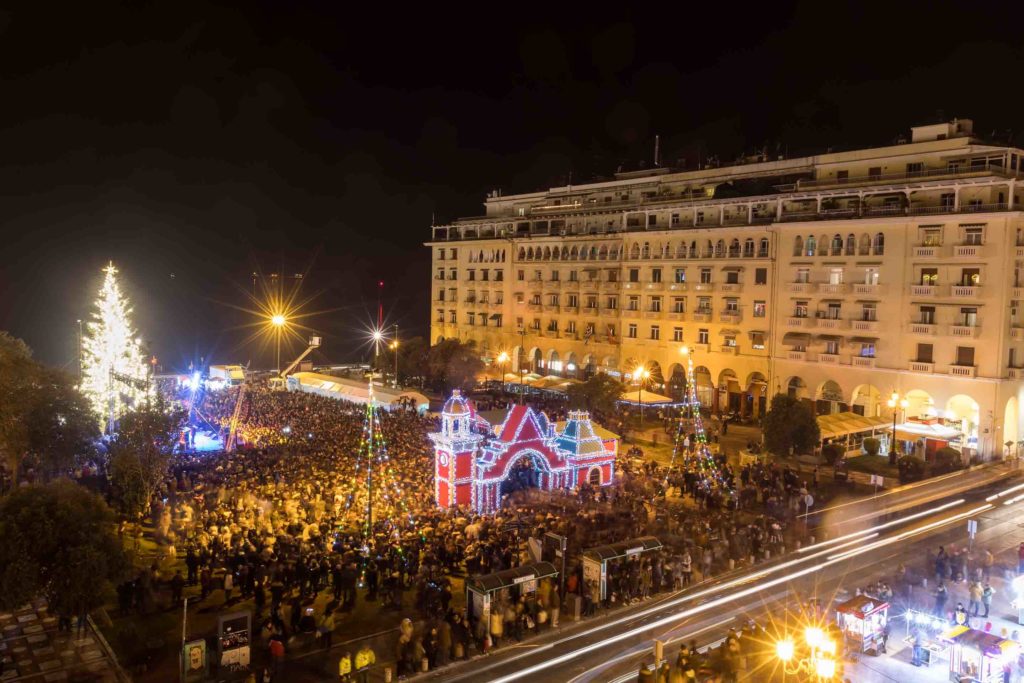
Important Dates for Christmas in Greece
In Greece, one major difference from the way the Western world celebrates is that Christmas Day is for family gatherings and big meals, but not an exchange of presents.
Instead, gifts are usually given to children on St. Basil’s Day, which is the first of January. Saint Basil himself is said to deliver the goodies to all the kid’s homes as well.
This means News Year’s is a bigger holiday in Greece.
On New Year’s Eve families gather to enjoy a feast and play some games. At midnight there is the usual celebration of fireworks and embraces between loved ones.
The sixth of December actually kicks off the whole holiday season. It’s a fitting start since this day is known in Greece as Saint Nicholas Day, revered as a significant figure in the church here.
Greek Lemon Chicken
Another date of importance is the sixth of January. This day is deemed the Epiphany and it’s also widely celebrated as the last day of the Christmas season.
It’s the day of Jesus’s baptism according to the Greek Orthodox church.
How Greeks Celebrate the Holidays
There are huge festivals all over on the Epiphany, with dancing, food, and boats. It’s also traditional for a priest to bless a cross and throw it into a nearby body of water like a river, lake, or even the sea.
Then many people will dive in and swim as quickly as possible to try and be the first to grab it. According to the local lore, this will grant them good luck for the whole year.
Starting on the sixth of December and ending on the sixth of January makes the whole Christmas season a month long in Greece.
Having such an extended holiday affair makes it feel even more special.
.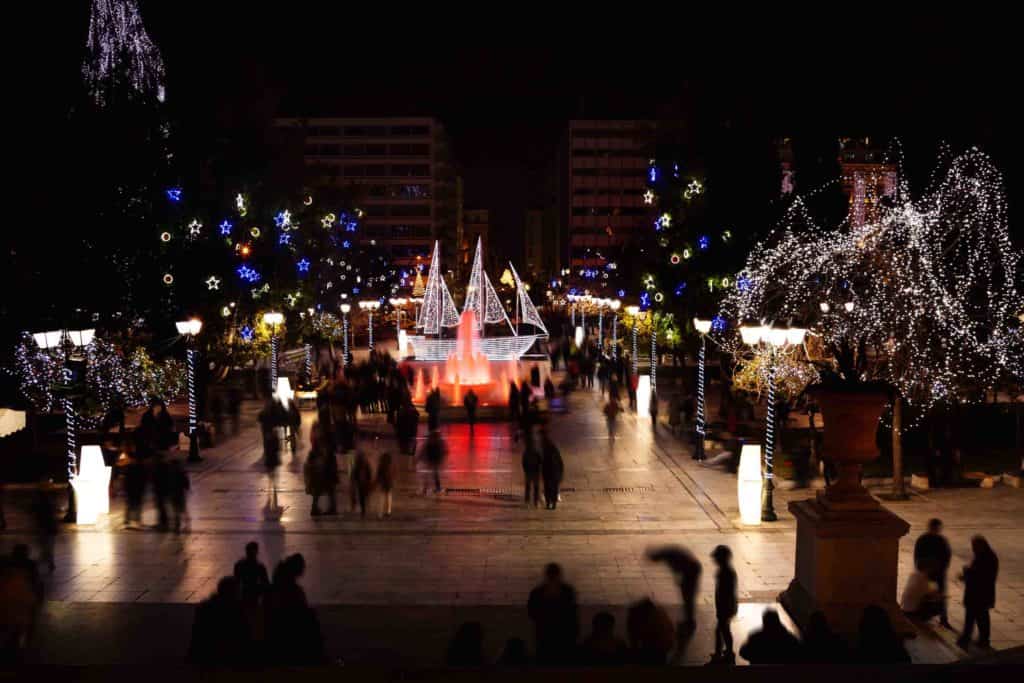
Christmas Decorations in Greece
Since Greece is surrounded by the sea, it makes sense that one of the most important Christmas decorations put up around the country are wooden boats.
This designated Christmas boat is called a karavaki. It’s an ancient custom developed long ago that’s still beloved today during Christmastime in Greece.
These large boats can be seen on display in all the big cities. Sometimes these decorative boats in place of and other times in addition to the more typical tall Christmas trees.
They range from decked out masted sailing ships covered in lights to miniature models painted gold. They oftenget carried around or put in the window of homes.
Christmas Trees in Greece
The Christmas tree is actually more of a recent addition to the decorations in Greece. It’s a crossover custom from other parts of the world that’s been embraced over the past few years.
It’s also very common to find a cross covered with a sprig of basil as a classic decoration.
A small bowl of water is attached at the bottom to keep the herb fresh. A designated family member will then sprinkle this water around the house each day to keep all the bad spirits away as well.
Under a Christmas tree in a family home in Greece, you’re likely to find an elaborate nativity scene instead of a pile of presents.
This is due largely to the religious nature of the country and to the tradition of gift giving on Saint Basil’s or New Year’s Day.
.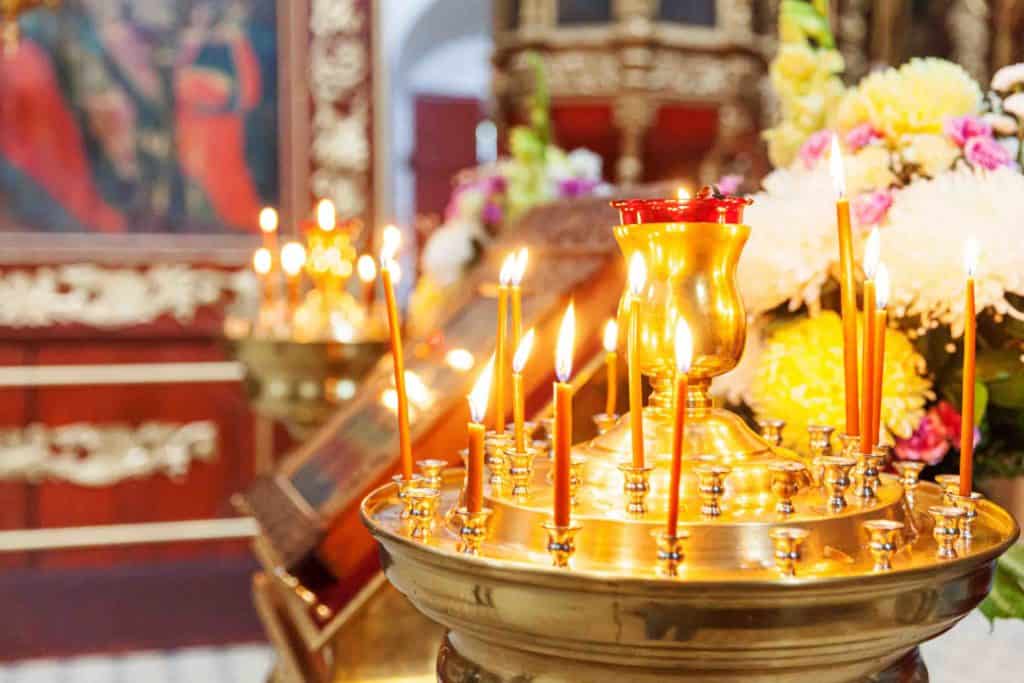
Greek Christmas Carols
Greek Christmas carols, or kanadas, are typically sung on Christmas Eve. Often young kids will go door to door with drums and tiny triangles to sing the festive tunes.
They will be rewarded with money or sweet treats like figs or nuts.
The children tend to start caroling quite early in the morning. Before they begin they will ask “na ta poume?” meaning shall we sing it?
It’s considered rude to say no. So nod your head and get ready to hear the sweet sounds of Greek Christmas songs.
Christmas in Jamaica
The melodies of these Christmas carols may sound a little unfamiliar as they are modeled after the stylings of Byzantine and Roman music.
The lyrics are centuries old and they all tell stories of Christ around the time that he was born.
Caroling is such a popular tradition in Greece throughout the holiday season. The songs are also performed by little ones on Christmas Day, New Year’s Eve, New Year’s Day, and the Epiphany.
There are even separate songs for each occasion.
.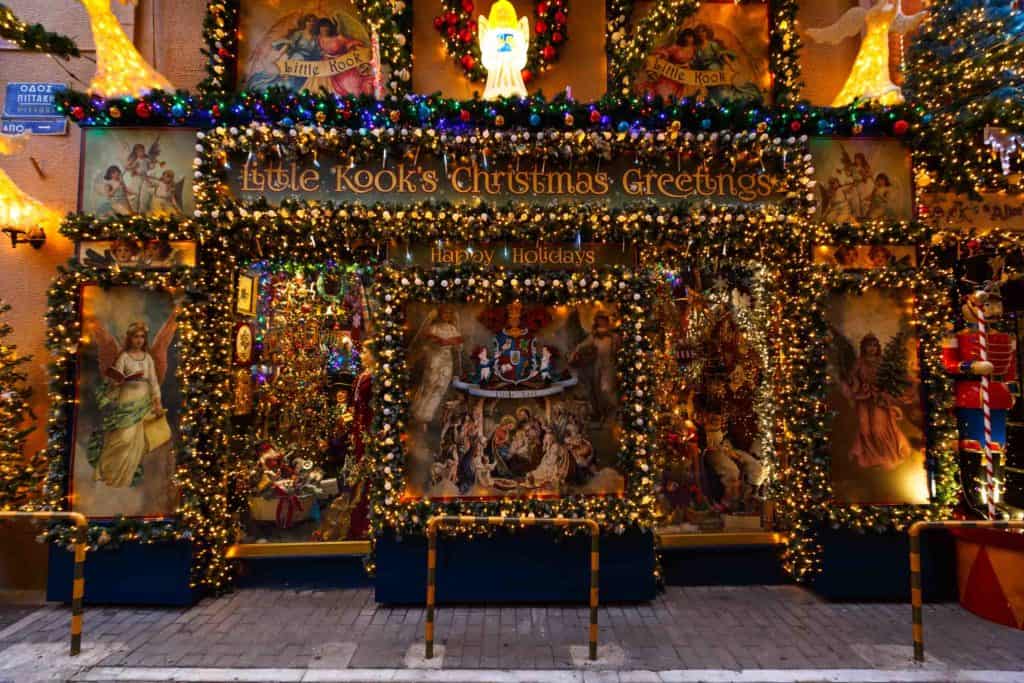
Christmas Traditions in Greece
Christmas traditions in Greece may be a little different than what you’re used to. You may not see the Santa we all know and love while spending Christmas here.
Greece has traded Saint Nick for Saint Basil. Also called Basil the Great, he’s from the same century and has adopted much of the same lore as our beloved Mr Claus.
The name for this Greek Santa is Aghios Vasilis. He is the patron saint of sailors and helped shape the Christian theology according to the Eastern Orthodox tradition. He is said to have cared for the weak and the poor.
St. Basil is famous for giving gifts to the children, which is why the exchange of presents is done on his designated day, the first of January.
Christmas Kallikantzaroi
The Christmas season is said to begin with the emergence of evil spirits.
They’re called kallikantzaroi. They come from underground and try to travel down the chimneys of every home. This legend is derived from Greek folk traditions.
The kallikantzaroi are goblin-like creatures often compared to elves and thought to be more troublesome than harmful.
Christmas in Ecuador
There are a few quirky customs families will do to protect themselves from these spirits.
One is burning a yule log in the fireplace every day. Another is placing a colander at the door, which is said to distract these not too bright beings.
They are banished finally on the Epiphany and return underneath the ground.
Other Christmas Traditions in Greece
There are also different little Christmas customs all over the country.
One is that the firstborn needs to enter the house before anyone else on New Year, leading with the right foot of course, to get good luck for the year.
Another is breaking a pomegranate at the front door of the home. The more seeds the better for this one, it means prosperity for the new year!
.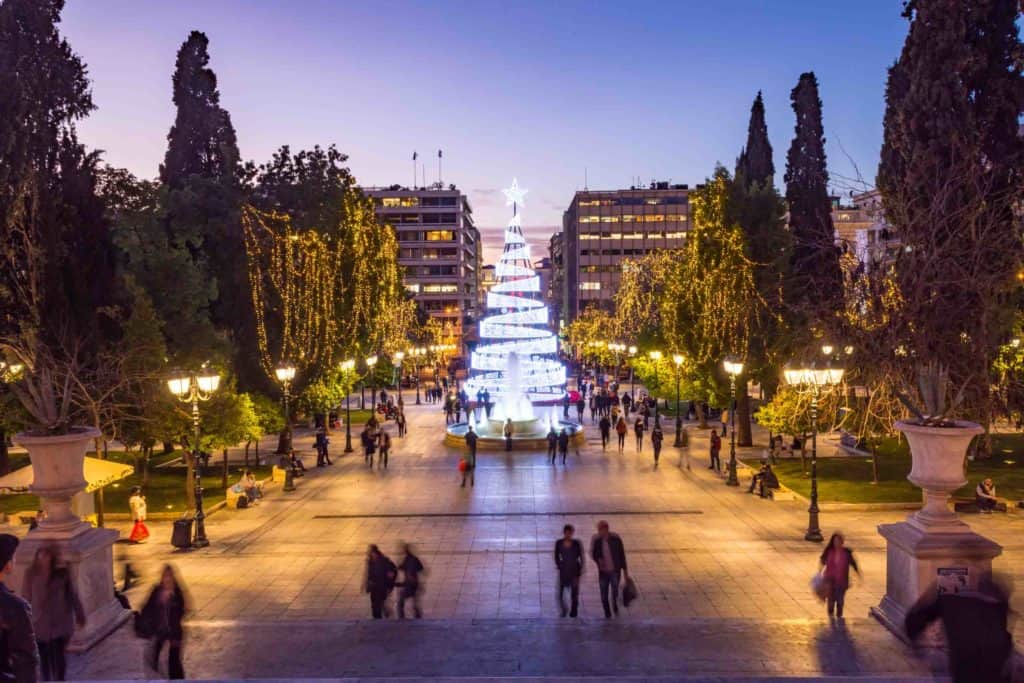
The History of Christmas in Greece
Greece may not be a popular Christmas destination, but did you know that it’s actually where so many of the more typical festive traditions come from?
The roots of Christmas are believed to largely stem from the Ancient Greeks who used to celebrate the birth of Dionysus in December.
Born from Zeus and a mortal mother, they called him a savior and a divine infant way back in 354 A.D.
Many similarities can be seen between these old customs and the modern ways in which Christmas is celebrated today.
Christmas in Cuba
In ancient Greece, they would decorate olive tree branches with autumnal fruits, nuts, small flasks of oil and honey, and red and white wool. This is said to resemble the way a Christmas tree is decorated.
Children would also go door to door to sing hymnal songs that were composed by Homer.
Dionysus was said to have a chariot that transformed into a sleigh and was pulled by horses, much like the story of Santa Claus states.
The practice of the Christmas boats actually began long ago as well in the Greek islands. A family would decorate boats in their homes to welcome their husbands and sons back from sea.
It’s also said that the first ever Christmas tree in Greece was set up in 1833.
.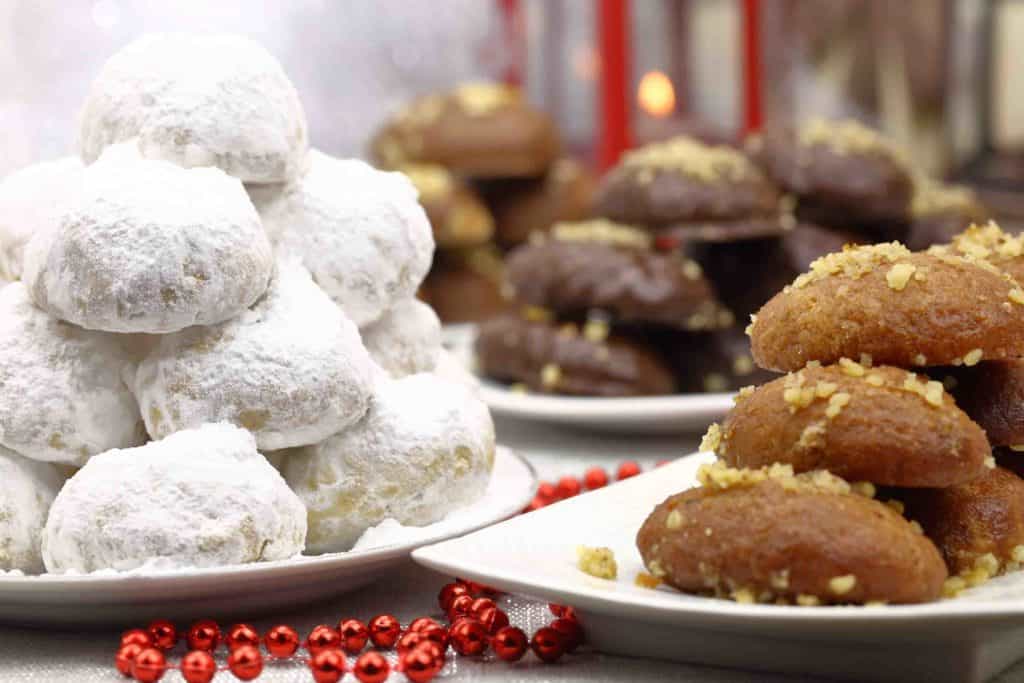
Greek Christmas Foods
Food is of course an essential part of any Greek Christmas. The dinner on Christmas day is always an opulent one.
Roast lamb or pork is the traditional main event of any Christmas feast in Greece, accompanied by a spinach and cheese pie on the side, called spanakopita.
It comes from an ancient tradition where Grecians would slaughter a pig in December. This is the meal that breaks the Advent fast.
The food is also really about family in Greece. Huge groups of family members gather altogether to spend the day stuffing, baking, and sautéing away before sitting down together to savor every bite.
Different regions in Greece will also enjoy different dishes. In Kozani expect stuffed cabbage while over in Thrace baklava is considered customary.
Sipping on mulled wine is the perfect way to wash down hearty plates during this time as well.
Hot salepi, a syrupy sweet tea, is also sold all over the streets during the Christmas season.
Of course, sweet treats abound this time of year, from phyllo pastries to spiced cookies.
Kourabiedes are a buttery almond cookie made with rose water and melomokaronas are a gingerbread cookie made with honey.
You may be asked to pick a side in the ongoing Christmas cookie debate while here for the holidays.
A sweet bread called christopsmos will also grace every table. It’s made with walnuts and spices. On St. Basil’s Day, a special pie is baked with a coin inside.
Whoever finds it in their piece will be blessed with good luck for the whole year.
.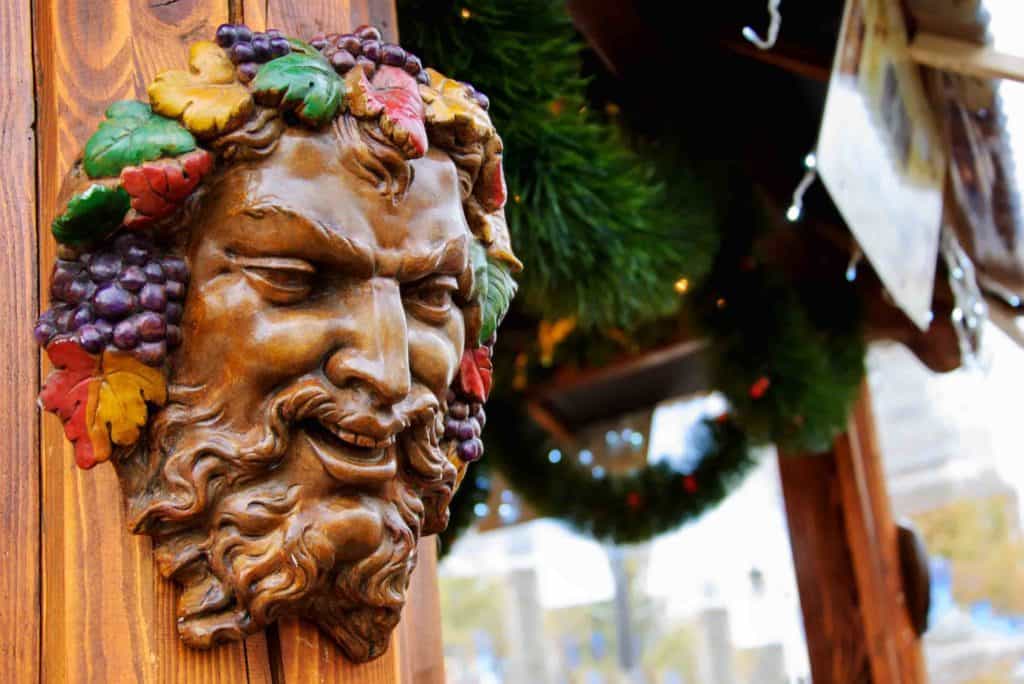
Greek Christmas Markets
Christmas markets in Greece sell tasty treats, as well as decorations to buy for your tree or your boat. It’s a time-honored tradition in much of Europe, and you’ll find some of the best ones anywhere in the cities here.
In Athens, the sprawling center of the city is Syntagma Square. It’s also the best place to see all the most iconic Christmas decorations and attractions in Greece.
Open-air concerts happen almost every night during the holiday season. They host huge bazaars, light shows, and flea markets just to name a few.
Even the surrounding streets are illuminated with sparkling lights.
Thessaloniki, the second largest city in Greece often called the co-capital, offers a lot of the holiday activities you may be more used to in the Western world.
Tzatziki Recipe
Aristotelous Square has a huge tree and massive boat all covered in twinkling Christmas lights. You’ll find food stalls, shops, performances, outdoor ice skating, and even a theme park.
Keep in mind that because Christmas is such a family oriented time in Greece, tickets to travel within the country during the holiday season can sell out way in advance.
If you’re hoping to hop from one spot to the next, make your transportation plans as early as possible.
.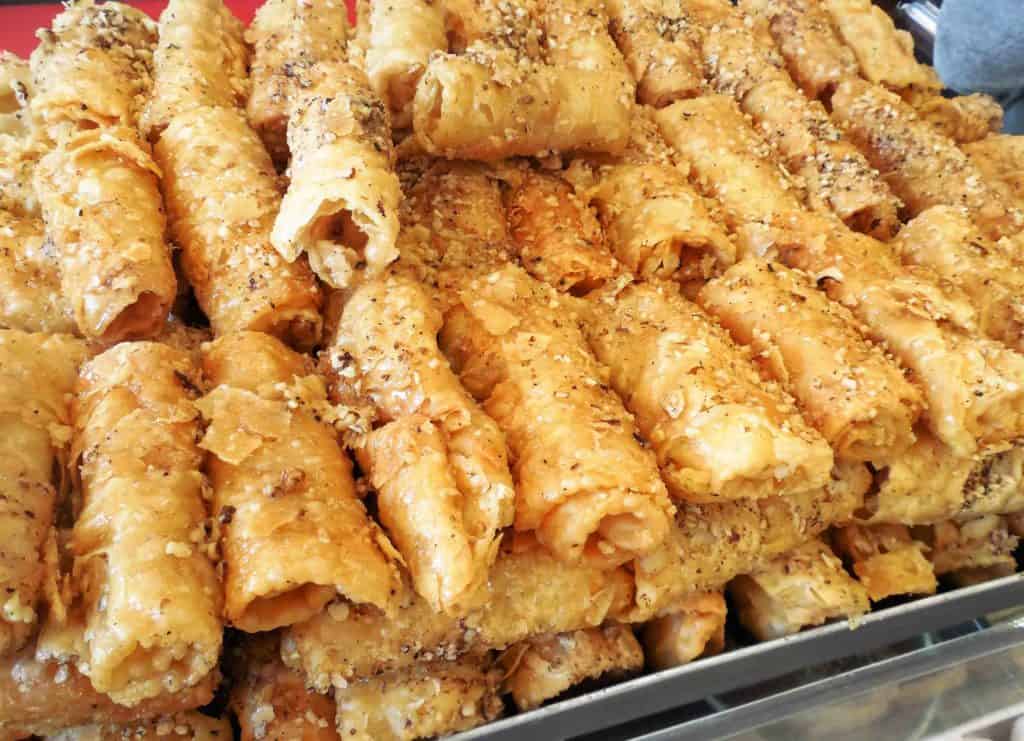
How to Say Merry Christmas in Greek
Merry Christmas in Greek is Kala Christougenna. The Greek word for Christmas literally translates to Christ’s birth.
It becomes the most common greeting that people say to one another all over the country during the whole season leading up to Christmas day.
Once the fated day finally arrives, the proper phrase becomes ‘many happy returns’ or hronia polla, when said in Greek.
If you stick around for the entire experience, you’ll want to learn Happy New Year as well, which is Chronia Polla.